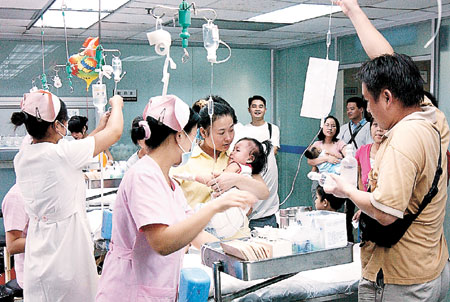
Don't say big hospitals stop outpatient infusion, even community hospitals can't escape!
The health and Family Planning Bureau of Shunde District, Foshan City, Guangdong Province recently issued a new policy: from January 1 next year, Shunde District will fully implement the policy of stopping intravenous infusion of antibiotics in outpatient patients, except pediatrics and emergency department, in public hospitals and their subordinate medical institutions and public community health service institutions, the Southern Metropolis Daily reported.
As soon as the news came out, it immediately aroused heated discussion. There are two voices on the Internet. Some citizens agree with the new deal and believe that it is conducive to guiding patients to use drugs rationally. However, some people do not agree that some diseases can get better faster with infusion, while others think that it should not be one size fits all. Completely cancel outpatient infusion. If you encounter a disease that must be infused, don't you have to be hospitalized, and you have to spend more money.
The grassroots also began to restrict infusion
In recent years, restrictions on antibiotic infusion have been introduced in succession, from large hospitals to small health centers. Antibiotic infusion may face "the most severe challenge in history".
Earlier, Gansu and Shaanxi health and family planning commissions began to restrict infusion in clinics, and intravenous infusion in village clinics was even banned in some areas. The health and Family Planning Commission of a city in Jiangsu Province also issued a notice to all health centers in the city, requiring that starting from April this year, the village clinics are not allowed to purchase antibiotics such as aloxicillin, amoxicillin clavulanic acid, cefotaxime, cefixime, cefazoxime, azithromycin injection and levofloxacin injection.
Everyone is terrified. When will the policy of restricting grass-roots infusion fall to their own area. After all, limiting outpatient infusion in large hospitals and limiting grass-roots infusion will not only affect patients, but also have a huge impact on the market sales of relevant pharmaceutical enterprises.
The prohibition of infusion cannot be applied across the board, and various schemes are formulated to ensure that the new regulations are implemented in place
Li Ziqing, deputy director of Shunde District Health and Family Planning Bureau, introduced that in recent years, with the rapid development of economic level, people's requirements for health have become higher and higher, and the wrong requirements of "short, flat and fast" have been generated for the curative effect of drugs. Therefore, the wrong recognition and medical habit of "good infusion and fast infusion" have been formed. The new deal is issued to standardize and rational drug use.
Although the new regulations prohibiting infusion in outpatient clinics will not be officially implemented until next year, Shunde people's hospital has begun to formulate various plans to ensure that the new regulations are implemented in place. The prohibition of outpatient infusion is not one size fits all. If the patient's condition requires infusion, the hospital has made a plan. "If you really need fluids, doctors can transfer patients to the emergency department, and some patients who need long-term infusion, such as diabetes, are diverted to a community hospital, which will not increase the burden of the emergency department." Pan Qiling, deputy director of the pharmacy department, said that for doctors, a doctor's rational drug use plan has also been formulated to strengthen the supervision of doctors' drug use.
The development of primary medical market is full of suspense
It is understood that China has not made unified provisions on outpatient infusion in hospitals at the national level, but so far, Anhui, Zhejiang, Jiangsu and Jiangxi have clearly introduced restrictive measures on outpatient infusion until it is completely abolished. Many provinces, prefectures, cities and medical institutions are gradually clarifying the policy of restricting outpatient infusion.
Jiangsu: at the end of last year, the health and Family Planning Commission of Jiangsu Province issued the notice on Forwarding the notice on Further Strengthening the management of clinical application of antibiotics, which clearly stipulates that from July 1, 2016, hospitals above the second level in Jiangsu Province (except children's hospitals) will completely stop intravenous infusion of antibiotics to patients undergoing outpatient diagnosis. By the end of 2016, hospitals above the second level in the province (except children's hospitals) will completely stop outpatient intravenous infusion.
Henan: from June 1, Henan Provincial People's hospital will cancel adult general outpatient infusion in addition to emergency and pediatrics. This also makes it the first large-scale public hospital in Henan Province to cancel outpatient infusion. In order to avoid unnecessary infusion behavior, Henan Provincial People's hospital even began to train doctors of the whole hospital three months ago. The hospital deleted the entry of "outpatient intravenous medication" in the hospital medical order and charging system. For outpatients who really need infusion treatment, Henan Provincial People's hospital can issue prescriptions for patients, recommend patients to grass-roots hospitals or community health service centers for treatment, and provide the specific address and contact information of community health service centers around the hospital.
Sichuan: on June 2, Sichuan Provincial People's Hospital officially announced that it would completely stop the infusion of adult outpatient (except special infusion such as pediatric and tumor outpatient chemotherapy). This is also the first class III hospital in Sichuan to stop outpatient infusion. Sichuan Provincial People's Hospital said that for patients with common and frequently occurring diseases, they can go to the community health service center for infusion or other treatment with the doctor's diagnosis report and treatment plan, and there is no need to register for further treatment.
Guangdong: Futian hospital officially announced that from June 1, except for emergency and pediatrics, the infusion of adult general outpatient service will be cancelled. In addition, in order to ensure that the suspension of infusion is implemented in place, Futian people's Hospital also issued "strict" Regulations: if an outpatient doctor violates the relevant provisions of infusion more than 3 times, his prescription right will be suspended for one month.
Zhejiang: at the beginning of this year, Zhejiang issued the most stringent "anti-bacterial restriction order" to stop the outpatient antibacterial infusion of tertiary hospitals. Zhejiang Provincial People's Hospital said that infusion treatment had been completely stopped since mid March, and the prescription of emergency intravenous infusion of antibiotics could only be prescribed for one day. From March 28, Hangzhou Xiaoshan District People's Hospital also stopped intravenous infusion of antibiotics in outpatients in addition to pediatrics. From March 21, Taizhou Central Hospital and Taizhou Enze hospital took the lead in completely stopping the intravenous infusion of antibiotics to outpatients, and the other six tertiary hospitals in the city will stop outpatient infusion one after another. From July 1, all tertiary hospitals in Huzhou, Zhejiang Province stopped outpatient antibacterial infusion.
Inner Mongolia: all outpatient infusion rooms of the people's Hospital of Inner Mongolia Autonomous Region have also been cancelled. The maternal and Child Health Hospital of the autonomous region and the Sixth Affiliated Hospital of Xinjiang Medical University have cancelled outpatient infusion rooms, and some emergency infusion rooms have been reserved for patients who need "drip" suddenly or at night. From June 1, Urumqi Friendship Hospital stopped outpatient infusion. From June 20 this year, Wuhai City has completely cancelled the intravenous infusion of antibiotics for outpatients in tertiary hospitals. At the same time, it has announced 53 common and frequently occurring diseases that do not need infusion treatment in outpatient and emergency departments, such as upper respiratory tract infection and children's hand, foot and mouth disease.
Fujian: since April 7, Sanming, Fujian Province, has completely stopped outpatient intravenous infusion (except Pediatrics), so as to reduce potential safety hazards of infusion and ensure medical quality and safety.
Hubei: from April 18, Huangshi Central Hospital of Hubei Province cancelled the general outpatient adult infusion, becoming the first hospital in the province to cancel the outpatient adult infusion.
Yunnan: from May 1, except for the emergency department and pediatrics, the people's Hospital of Gejiu City, Yunnan Province will stop outpatient infusion, that is, stop intravenous infusion of antibiotics
Previously, Henan, Sichuan and other regions adopted the compromise treatment of prescribing in large hospitals and allowing patients to go to grass-roots medical institutions for infusion, which sank the demand to the grass-roots market, but now the development of the grass-roots market is also limited, and the development of antibiotics seems to be full of suspense.
At the same time, all localities have also strengthened the management of infusion services in grass-roots medical institutions. Earlier, Gansu and Shaanxi health and family planning commissions began to restrict infusion in clinics, and intravenous infusion in village clinics was even banned in some areas.
The Hunan Provincial Health and Family Planning Commission issued the notice on the detailed rules for the implementation of the measures for the management of village clinics in Hunan Province (for Trial Implementation), which made it clear that only those who meet the following conditions can receive infusion, and all intravenous drug delivery services are prohibited if they fail to meet the standard:
Village clinics must meet the following conditions at the same time and can provide intravenous drug delivery services only after being approved by the county-level health and family planning administrative department:
1. Have independent intravenous administration observation room and observation bed, and the use area of the observation room shall not be less than 10 square meters;
2. Provide common rescue drugs, equipment and oxygen supply;
3. Meet the conditions for intravenous drug allocations;
4. The personnel in the village clinic who carry out intravenous drug administration service shall have the first-aid measures and first-aid ability to prevent and deal with infusion reactions;
5. The business of intravenous administration of antibiotics shall comply with the relevant provisions on the clinical application of antibiotics.
From the above, we can see that if the infusion conditions are met, there must be a diagnosis room, treatment room, pharmacy and observation room. These areas add up to 60 ~ 100 square meters, which is difficult to reach for ordinary village clinics, and there is no fund to expand; The rescue measures and equipment for dealing with infusion reaction are difficult to be complete, so most doctors will automatically give up the business of infusion for the sake of insurance.
The market impact of restricting and banning infusion on village clinics and even grass-roots medical institutions should not be underestimated. As a grass-roots doctor, instead of fearing when the policy of restricting grass-roots infusion will fall to his own area, he might as well seize the opportunity in the crisis, walk in front of others, improve himself, learn and carry out safer and more convenient characteristic diagnosis and treatment in time.
Summary:
At present, the treatment of antibiotics has entered the institutionalized and normalized management stage. The management of intravenous infusion will be strengthened to reduce the unreasonable use of antibiotics due to profit seeking. It is necessary to subdivide and clarify the use levels of different antibiotics. For some diseases and some disease states, where antibiotics are not allowed to be used, it will further clarify which antibiotics are allowed to be used by different medical institutions. Some medical institutions, such as grass-roots medical institutions, need to restrict the use, or medical institutions without very good detection and testing ability, Will limit the use of high-level antibiotics.
In short, the prohibition of infusion has become an irreversible trend, but when the policy goes to the grass-roots level, we should really give more consideration to the current situation of grass-roots medical treatment. We should not only take into account the interests of patients, but also help the development of grass-roots medical treatment. Otherwise, it is difficult to fundamentally change the current situation of infusion flooding, and the grass-roots level can not treat patients and save people well. Only by creating good conditions and rules can the grass-roots level really give full play to its great value!
Source: clinic owner's house
